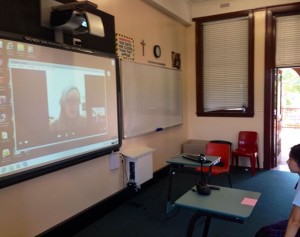
Image source: https://www.flickr.com/photos/duncan/5825570533/ by duncan c
I’m starting to realise I’m a naïve idealist. I want to teach in a way that benefits every single one of my students. I want all my students to learn and achieve as well as they possibly can. I want all my students to enjoy learning, embrace their positive passions and have a fulfilling life. That’s all.
I started studying my Masters of Education just for the piece of paper at the end but fell in love with the course with the very first two subjects, Curriculum and Pedagogy. I was lucky enough to be well versed in the language of current thinking in these areas. However, what kept biting me was the amount of rhetoric I was inclined to use without evidence. Now, I’m so into what I have been learning for the last year and a half I want to just keep on going.
It felt like I started my PhD this year but technically that’s a long way off yet. When I finish my M.Ed., I enter the second year of a Masters of Research and then commence my PhD at the end of that. These last two subjects of my M.Ed. are proving a bit of a stumbling block though. One, a Literature Review, is meant to help me gain some background knowledge on the area I’m going to cover in my PhD but my grand ideas of writing about some of the big concepts in education keeps being narrowed down and down to a manageable size. Of course I want my studies to be manageable but I also want to make a big difference. I don’t think it’s an ego thing but instead I am driven by trying to find what’s the best we, as teachers, can do to help our students. My other subject is the one I wrote about in my last two posts, an Introduction to Educational Research (EDCN800).
Only three of the usual crowd of twelve or so turned up for EDCN800 last night, yet I came away more confused than when I arrived and wondered if it had been worth it. Before arriving, I had a clear idea of what I was going to do for the next task (design a qualitative research study) and had received 3/3 for my proposal (my only 3/3 for our first task) but alas, no more. You see, I made the mistake of making it an authentic task, something I could see myself doing in real life but really, all we have to do is go through the motions. My idealism protested somewhat. I want my learning to be meaningful and practical during the process of doing it. I’m not just after the marks or even learning this now for some research I might do in the future; as I learn about how to design qualitative research, I want to be actually, in reality, authentically, designing qualitative research.
However, a piece I have to write within three weeks for a uni assignment is not reality, particularly when talking about designing qualitative research; it normally takes much longer than that. The literature review I am writing within one semester cannot contain every single article that I need to read to produce a doctorate thesis. I am struggling with these limitations!!!
How much more then, are we struggling in high schools to make learning authentic? How can we help our students think they have something to contribute to the world when we have such short times on any one task, any one topic? Some say school isn’t real life, that it is a false, socially constructed institution and that we should just accept that it is a mere addendum on real life. How can we make secondary school learning authentic and meaningful if we can’t make it about the real world? Do I ask too much?
PS
Perhaps my next post will need to be about the benefits of learning for the accumulation of knowledge rather than for practical application because of course, I see a place for that too in our curriculum. For instance, I know many teachers and students who love learning about Ancient History for the sake of mere interest. I love novels for what they say about the human condition.
PPS
My literature review has morphed into the question:
What do we know about the connection between ‘assessment for learning’ and the self-regulation of students in secondary social sciences?
My qualitative research design will be probably based on the question:
How have teachers responded to change?





